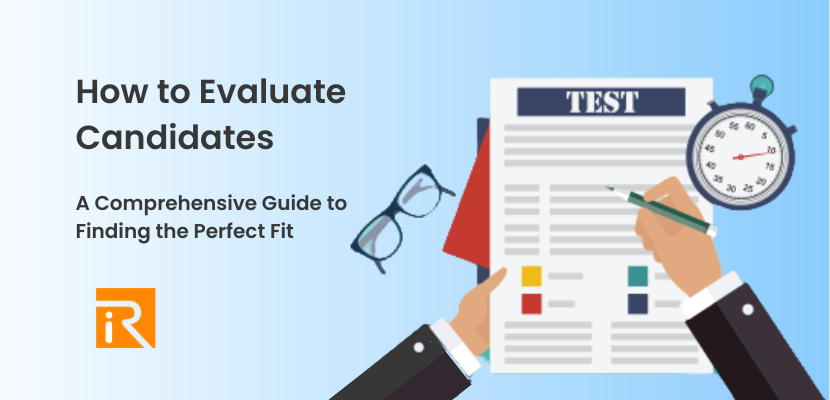
When it comes to building a successful team, one of the most crucial steps is finding the right candidates who possess the skills, experience, and cultural fit for your organization. The hiring process can be challenging, but with a systematic and thorough evaluation approach, you can increase your chances of selecting top-notch candidates. Therefore, in this article, we will delve into the intricacies of evaluating candidates and provide you with valuable insights and practical tips to streamline your hiring process. So, let’s dive in and discover how to evaluate candidates effectively!
What is Candidate Evaluation?
Candidate evaluation refers to the comprehensive assessment of job applicants during the hiring process. It involves analyzing candidates’ qualifications, skills, experiences, and cultural fit to determine their suitability for a specific role within an organization. Therefore, through candidate evaluation, hiring managers gain a deeper understanding of an applicant’s potential, enabling them to make informed decisions when selecting the most suitable candidate for a position.
The Importance of Candidate Evaluation
Effective candidate evaluation plays a vital role in ensuring that organizations hire the right individuals. So, let’s explore some key reasons why candidate evaluation is essential:
Identifying the Best Fit
Candidate evaluation allows employers to assess the skills, qualifications, and experiences of applicants in relation to the specific requirements of the job. By thoroughly reviewing resumes, conducting interviews, and administering assessments or tests, organizations can identify candidates who possess the necessary competencies and expertise. Additionally, this helps narrow down the pool of applicants and focus on individuals who are most likely to succeed in the position. Therefore, selecting candidates who are a good fit for the role increases the chances of long-term success and job satisfaction.
Reducing Turnover
Proper candidate evaluation plays a crucial role in reducing turnover rates within an organization. By conducting comprehensive evaluations, organizations can gain a deeper understanding of a candidate’s abilities, work style, and potential cultural fit within the company. This information allows employers to make more informed hiring decisions and select candidates who are not only technically qualified but also align with the company’s values and goals. Hiring individuals who are a good fit reduces the risk of hiring the wrong person, resulting in lower turnover rates, improved employee retention, and reduced costs associated with recruitment and training.
Enhancing Team Dynamics
Assessing candidates for cultural fit is essential for fostering a positive work environment and enhancing team dynamics. Evaluating a candidate’s personality traits, communication style, and ability to collaborate with others can help identify whether they will integrate well with the existing team. A cohesive and harmonious team environment promotes collaboration, productivity, and job satisfaction. By selecting candidates who align with the organization’s values and can work effectively with the team, employers can create a supportive and inclusive workplace culture.
Saving Time and Resources
Thorough candidate evaluations conducted early in the hiring process can save time and valuable resources. By establishing clear criteria for evaluating applicants and using effective screening methods, HR professionals can efficiently filter out unsuitable candidates. This ensures that the hiring team’s focus is directed towards candidates who have a higher chance of success. By reducing the time spent on reviewing applications and interviewing candidates who are not the right fit, organizations can streamline their hiring procedures and allocate resources more effectively.
Building a Strong Reputation
Consistently hiring the right candidates contributes to building a strong reputation for an organization. When skilled and talented individuals join the team, they bring valuable expertise and contribute to the company’s success. High-performing employees who are satisfied with their roles become advocates for the organization, promoting its positive image and attracting top talent in the future. Building a reputation for making informed and effective hiring decisions enhances an organization’s credibility and increases its ability to attract and retain top-quality candidates. In conclusion, effective candidate evaluation is crucial for organizations to identify the best fit for a particular role, reduce turnover, enhance team dynamics, save time and resources, and build a strong reputation. By implementing robust evaluation processes, organizations can make informed hiring decisions that lead to long-term success and contribute to a positive and thriving work environment.
How to Evaluate Candidates: A Step-by-Step Process
-
Define Clear Job Requirements
Before you start evaluating candidates, it’s essential to have a clear understanding of the skills, qualifications, and attributes required for the position. Define the core competencies and specific qualifications needed to excel in the role. This clarity will enable you to effectively evaluate candidates based on the criteria that truly matter for your organization.
-
Screen Resumes and Cover Letters
The initial step in evaluating candidates is to review their resumes and cover letters. Look for relevant experience, education, and qualifications that align with the job requirements. Take note of any achievements or accomplishments that stand out. Additionally, pay attention to their written communication skills and how effectively they present themselves on paper.
-
Conduct Phone Interviews
Phone interviews are an excellent way to narrow down the pool of candidates before inviting them for in-person interviews. Prepare a set of structured questions to assess their knowledge, skills, and cultural fit. Pay attention to their communication style, enthusiasm, and how well they articulate their thoughts over the phone.
-
Prepare Structured Interview Questions
When it’s time for in-person interviews, create a list of structured interview questions that cover various aspects of the role. These questions should help you gauge the candidates’ technical proficiency, problem-solving abilities, and behavioral traits. Use the same set of questions for each candidate to ensure a fair evaluation.
-
Assess Technical Skills
For positions that require specific technical skills, it’s crucial to assess candidates’ proficiency in those areas. Consider conducting technical tests or requesting work samples to evaluate their ability to perform the tasks required for the role. This step will help you identify candidates who possess the necessary skills to excel in the position.
-
Evaluate Soft Skills and Cultural Fit
Technical skills alone are not sufficient for long-term success within an organization. Assessing candidates’ soft skills, such as communication, teamwork, adaptability, and problem-solving, is equally important. Additionally, evaluate their alignment with your company culture to ensure they can thrive in your work environment.
-
Use Behavioral Assessments
Behavioral assessments, such as personality tests and situational judgment tests, can provide valuable insights into candidates’ behavior, decision-making, and interpersonal skills. These assessments help you predict how candidates will perform in specific situations and whether their values align with your organization’s culture.
-
Check References
Once you have identified potential candidates, it’s crucial to conduct reference checks. Reach out to their previous employers or professional contacts to verify their employment history, performance, and character. References can offer valuable insights into a candidate’s strengths, weaknesses, and overall suitability for the role.
-
Consider Practical Assignments or Simulations
In certain roles, it may be beneficial to incorporate practical assignments or simulations into your evaluation process. This step allows candidates to showcase their skills in a real-world context and provides you with a deeper understanding of their capabilities and problem-solving approach.
-
Make a Well-Informed Decision
After thoroughly evaluating candidates using the steps mentioned above, it’s time to make a well-informed decision. Consider all the information you have gathered, including their qualifications, skills, cultural fit, and assessments. Evaluate each candidate against the defined job requirements and determine who best meets your organization’s needs.
How to Evaluate Candidates During Interview
The process of evaluating candidates during an interview can be divided into several key aspects. Each aspect plays a vital role in understanding the candidate’s qualifications, competencies, and potential cultural fit. Let’s delve into each of these aspects and explore effective methods for evaluation.
Assessing Technical Competence
To evaluate candidates’ technical competence, it is crucial to design interview questions that directly assess their skills and knowledge. This ensures that the selected candidate has the expertise required to perform the job successfully. Consider incorporating the following strategies:
Tailor Questions to the Role
Craft interview questions that specifically target the technical requirements of the role. For example, if you are hiring a software engineer, ask coding-related questions or present a hypothetical scenario related to software development. Tailoring questions to the role helps assess the candidate’s ability to apply their technical knowledge in practical situations.
Use Practical Assignments or Tests
Supplementing interviews with practical assignments or tests can provide a more accurate evaluation of candidates’ technical abilities. This approach allows candidates to demonstrate their skills in action, showcasing their problem-solving capabilities and approach to real-world challenges.
Evaluating Soft Skills
Soft skills are equally important when assessing candidates. These skills include communication, teamwork, adaptability, and critical thinking. Effective evaluation of soft skills can be achieved through various methods:
Behavioral Questions
Ask candidates behavioral questions that prompt them to share examples of how they handled specific situations in the past. This technique helps evaluate their interpersonal skills, problem-solving abilities, and decision-making processes. For instance, you could ask, “Tell me about a time when you faced a challenging deadline. How did you prioritize your tasks and ensure successful completion?”
Role-Playing Scenarios
Conduct role-playing scenarios to assess candidates’ ability to handle realistic workplace situations. This approach provides insights into their communication, conflict resolution, and problem-solving skills. Present a scenario relevant to the role and observe how the candidate interacts and responds.
Cultural Fit Assessment
Ensuring a candidate’s cultural fit is crucial for a harmonious work environment. Evaluating cultural fit helps determine whether candidates align with the organization’s values, norms, and work ethic. Consider the following approaches:
Company Values Alignment
During the interview, discuss your company’s values and observe how candidates respond. Ask them about their own values and assess if they resonate with the organization’s culture. This will give you an indication of how well they may fit within the existing team.
Team Compatibility
Evaluate the candidate’s potential to collaborate and work effectively within the existing team structure. Assess their ability to adapt to different working styles and personalities. This can be done through group interviews, where you observe how candidates interact with others and contribute to discussions.
The Importance of Continuous Evaluation
Once you have successfully evaluated and selected candidates, the evaluation process doesn’t stop there. Continuous evaluation of employees is crucial for their growth and development within your organization. It allows you to assess their performance, provide feedback, and identify areas for improvement. Here are a few key reasons why continuous evaluation is essential:
-
Performance Assessment and Feedback
Regular evaluation provides an opportunity to assess an employee’s performance against set goals and objectives. It helps identify strengths and weaknesses, enabling you to provide constructive feedback that supports their professional growth. Additionally, by addressing performance-related issues promptly, you can ensure that employees are continuously improving and meeting expectations.
-
Skill Development and Training
Continuous evaluation allows you to identify skill gaps within your team. By understanding the specific areas where employees need improvement, you can provide targeted training and development opportunities. So, this investment in their skills not only benefits the individual but also enhances their contributions to the organization.
-
Recognition and Rewards
Evaluation provides a platform to recognize and reward outstanding performance. When employees feel acknowledged for their hard work and achievements, it boosts their morale and motivation. Therefore, recognizing exceptional contributions can also inspire others to strive for excellence, creating a culture of high performance within your organization.
-
Career Pathing and Succession Planning
Regular evaluation helps identify high-potential employees who can be groomed for future leadership positions. By assessing their skills, performance, and potential, you can develop a strategic succession plan. Additionally, this ensures a smooth transition when key roles become vacant and provides growth opportunities for talented individuals within your organization.
-
Continuous Improvement and Adaptation
Evaluation also enables you to assess the effectiveness of your hiring and onboarding processes. By analyzing the performance of new hires, you can identify areas where improvements can be made to enhance the candidate evaluation process. Therefore, this iterative approach ensures that you are constantly adapting and refining your recruitment strategies to attract and select the best candidates.
Unlocking the Power of Evaluation
Consequently, in the competitive business landscape, the ability to effectively evaluate candidates is a valuable skill that can significantly impact the success of your organization. By following a systematic and thorough evaluation process, you can identify candidates who possess the skills, experience, and cultural fit necessary for your team. Additionally, remember to define clear job requirements, screen resumes, conduct interviews, and assess both technical and soft skills. Consider cultural fit, use behavioral assessments, and conduct reference checks to make a well-informed decision. However, the evaluation process doesn’t end once candidates are selected. Continuous evaluation of employees is equally important. It allows you to assess performance, provide feedback, support skill development, recognize achievements, plan for succession, and drive continuous improvement within your organization. So, embrace the power of evaluation, and you’ll be well on your way to building a talented, high-performing team that propels your business to new heights.
FAQs
-
How important is cultural fit when evaluating candidates?
Cultural fit is crucial when evaluating candidates. It ensures that the candidate’s values, behaviors, and working style align with your organization’s culture. Therefore, a strong cultural fit promotes better teamwork, employee engagement, and overall organizational success.
-
Should I prioritize skills or experience when evaluating candidates?
While both skills and experience are essential, it ultimately depends on the specific role and your organization’s needs. Consider the level of proficiency required for the position and the potential for growth. A combination of relevant skills and some level of experience can often be an ideal balance.
-
How can I assess a candidate’s problem-solving skills?
Assessing problem-solving skills can be done through behavioral interview questions or by incorporating practical exercises and case studies into the evaluation process. Additionally, ask candidates about specific challenges they have faced in the past and how they approached finding solutions. Also, look for critical thinking, analytical skills, and the ability to handle complex problems.
-
Is it necessary to conduct background checks on candidates?
Yes, conducting background checks is an important step to ensure the accuracy of the information provided by candidates and to verify their qualifications and employment history. Additionally, it helps mitigate any potential risks and ensures that you are making an informed decision.
-
How can I ensure a fair evaluation process for all candidates?
To ensure a fair evaluation process, establish clear evaluation criteria and use the same set of structured questions for each candidate. Additionally, avoid bias by focusing on objective qualifications and skills rather than personal characteristics. Also, document your evaluation process to maintain transparency and consistency.
-
What role does diversity play in candidate evaluation?
Diversity plays a significant role in candidate evaluation. A diverse workforce brings a range of perspectives, ideas, and experiences, fostering innovation and creativity within an organization. Therefore, it’s important to consider diversity as one of the criteria when evaluating candidates to build a well-rounded team.


























